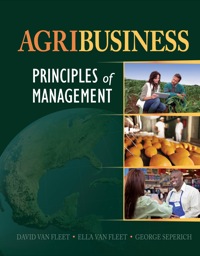Ponce de Leon arrived in the New World with one quest in mind: to fi nd the
Question:
Ponce de Leon arrived in the New World with one quest in mind: to fi nd the fountain of youth. In the fifteenth and sixteenth centuries the search for youth was paramount. It was important because most people died before they reached 50 years of age. The rigor of life and disease took its toll. Today the quest is for a magic potion, lotion, or fountain to stave off obesity or being overweight. We know that in most advanced economies we will live well into the eighth decade of our lives, but the specter of obesity casts a broad shadow over our existence. There is a caveat that makes this need a challenge: We want to make decisions that enable us to attain this state without giving up lifestyle and food.
Interestingly, perhaps magically, a “magic” potion does exist, and it can be obtained from a fountain.
The name of this magic elixir is water. The most common, least expensive, and most important liquid on our planet seems to have almost magical properties. A 12-week randomized, controlled study with nearly 50 human volunteers from Virginia Tech demonstrated that drinking a half-liter of water (a little more than one pint) before each meal every day for three months led to weight loss. A year after the study ended, the participants could still eat whatever they wished and return to their normal lifestyles without gaining back their earlier weight. Most continued to drink water before meals because they liked it.
Water is most common because it is known by everyone, not because everyone possesses it. Common water, fresh water, is not that common; 97.5 percent of Earth’s water is not fresh. It is salt water; only 2.5 percent is fresh, drinkable water. Of this 2.5 percent that is drinkable, only 0.8 percent is available in surface, atmosphere, and ground water. The remainder is locked in glaciers, ice caps, and permafrost. Water, it turns out, is not that common after all.
Water and agriculture/agribusiness are practically synonymous terms. Water is vital to agriculture.
Soil viability and seed fertility are important, but they also are meaningless without the presence of water.
Measured as consumptive use, that is, water unavailable for further use in the system, agriculture consumes 93 percent of all water, and domestic and industrial uses account for the remainder.
We know instinctively how important water is to our existence. As we become more sophisticated and travel through our solar system now and galaxies later, what commodity will designate a planet as a candidate for colonization? Water.
QUESTIONS
1. Is the transporting of water, by bottle or otherwise, a solution to the worldwide shortages of clean, potable water that already exist? Explain your answer.
2. What are some possible solutions to the shortage of water for agricultural use?
3. The availability of water differs from one state to another and from one country to another, but are all people equally entitled to water? How can we ensure that people who don’t have enough water can get access to water at an affordable price?
Step by Step Answer:

Agribusiness Principles Of Management
ISBN: 9781285952352,9781285947839
1st Edition
Authors: David Van Fleet, Ella Van Fleet, George J. Seperich





